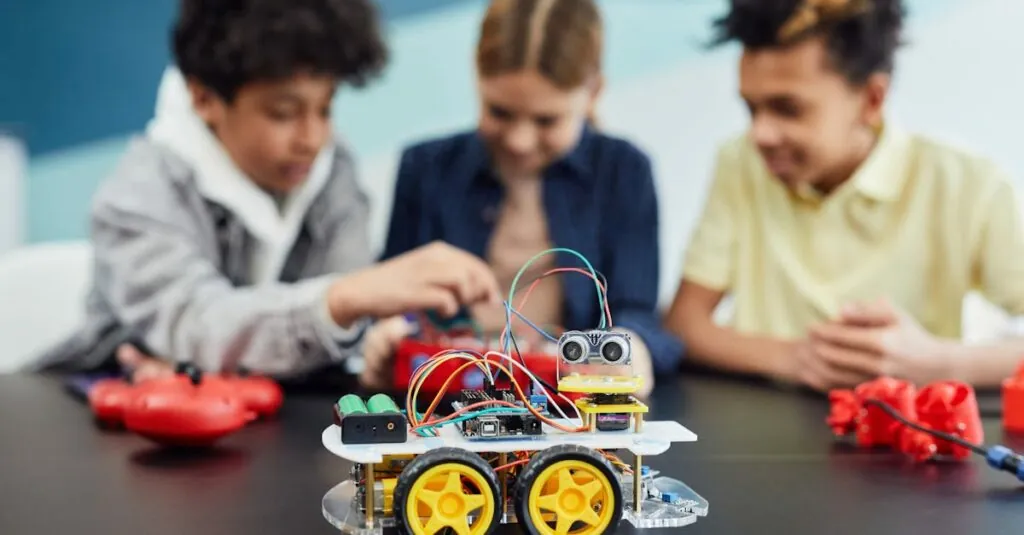In a world where technology evolves faster than a cat meme goes viral, the tech space is the playground for innovation and creativity. From sleek gadgets that fit in your pocket to software that practically reads your mind, this realm is where dreams become reality—sometimes with a few unexpected glitches.
Imagine a place where artificial intelligence can brew your coffee while you binge-watch the latest series. Sounds like a sci-fi movie, right? But it’s happening right now. The tech space isn’t just for the nerds in hoodies anymore; it’s a vibrant ecosystem that impacts everyone’s daily life. Buckle up as we dive into this electrifying universe, exploring the trends, breakthroughs, and the occasional tech blooper that keeps us all on our toes.
Table of Contents
ToggleOverview of the Tech Space
The tech space encompasses a vast array of developments and innovations that continually shape society. Trends like artificial intelligence, machine learning, and the Internet of Things drive this evolution. Businesses of all sizes leverage these technologies to streamline operations and enhance customer experiences.
Cloud computing significantly alters how organizations store and access data. Its scalability allows enterprises to expand resources according to demand. Cybersecurity measures grow increasingly important as more sensitive information moves online. Consumers often rely on tech solutions for everything from banking to shopping.
Startups frequently emerge in this sector, introducing disruptive ideas that challenge established norms. Incubators and accelerators support these fledgling companies, fostering an environment ripe for creativity. Funding remains essential; venture capitalists often target promising tech firms for potential high returns.
Mobile applications transform daily interactions, enabling users to manage tasks on the go. Health tech applications provide personalized wellness solutions, impacting how people monitor and improve their health. Wearable technology integrates seamlessly with users’ lives, offering real-time data on fitness and health metrics.
Sustainability continues to be a driving factor in tech development. Companies are increasingly adopting eco-friendly practices and technologies to reduce environmental impact. Innovations in renewable energy technologies show great promise in creating a sustainable future.
The tech space evolves rapidly, and its influence permeates every facet of life. Innovations reshape industries while providing consumers with advanced tools to improve everyday experiences. As developments unfold, understanding these shifts becomes crucial for individuals and organizations alike.
Key Trends in the Tech Space
Current trends in the tech space highlight significant advancements and integrations shaping modern society. These developments impact various industries, creating opportunities and challenges alike.
Artificial Intelligence Advances
Artificial intelligence (AI) continues to transform numerous sectors. Businesses are harnessing AI for data analysis and decision-making, enhancing productivity. Natural language processing enables more effective communication between humans and machines. Enhanced machine learning algorithms allow companies to predict customer behavior and personalize experiences. Real-time data processing equips organizations to respond to trends instantly. Autonomous systems, such as self-driving cars, represent a forward leap into the future of transportation. As AI technology progresses, ethical considerations grow in importance, prompting discussions about privacy and bias in algorithmic decision-making.
Internet of Things Expansion
Internet of Things (IoT) technology is rapidly expanding, connecting everyday devices to the internet. Smart home devices enhance convenience and energy efficiency, allowing users to control their environment remotely. Wearables track health metrics, offering insights into personal wellness. In industrial settings, IoT sensors optimize operations by monitoring equipment performance and predicting maintenance needs. Data collected from these devices facilitate better decision-making and resource management. Industries like agriculture and healthcare benefit tremendously from IoT integration, improving production and patient care. As the IoT ecosystem grows, security challenges must be addressed to protect sensitive user data.
Major Players in the Tech Space
The tech space features a diverse range of influential companies and innovative startups driving progress.
Established Companies
Tech giants hold considerable market share and influence on industry trends. Companies like Apple, Google, Amazon, and Microsoft continually invest in new technologies. These organizations focus on areas such as artificial intelligence, cloud computing, and e-commerce, shaping the landscape with their products and services. Innovation from these companies often results in significant shifts within the marketplace, affecting both consumers and competitors alike. Research and development remain central to their strategies, ensuring they stay relevant in a rapidly changing environment.
Startups to Watch
Exciting startups are emerging, showcasing disruptive ideas and solutions. Companies such as UiPath and Snowflake are gaining attention for their unique approaches to automation and data management. Many of these startups focus on niche markets, leveraging technologies like machine learning and blockchain. Venture capitalists support their growth, seeking high returns through strategic investments. Continuous innovation characterizes these businesses, enabling them to challenge established players in the tech space. Keeping an eye on these startups can reveal future industry leaders and trends.
Innovations Shaping the Future of the Tech Space
Innovations continuously reshape the tech space, driving significant changes across various sectors. Emerging technologies play a crucial role in this evolution.
Emerging Technologies
Artificial intelligence stands at the forefront of emerging technologies, revolutionizing industries through automation and data processing. Machine learning enhances predictive analytics, enabling businesses to make informed decisions quickly. Augmented reality transforms user experiences, providing immersive interactions in gaming, retail, and education. Blockchain technology improves transparency and security in transactions, particularly in finance and supply chains. Quantum computing, while still in its infancy, promises unparalleled processing power, capable of solving complex problems beyond traditional computers. These technologies collectively contribute to efficiency and connectivity, paving the way for future advancements.
Sustainability in Tech
Sustainability increasingly influences the tech landscape as companies adopt eco-friendly practices. Renewable energy sources power data centers, reducing carbon footprints and operational costs. Electric vehicles gain traction, promoting cleaner transportation solutions in logistics and personal use. Tech firms prioritize resource efficiency, designing products that minimize waste and optimize energy consumption. Circular economy models encourage recycling and repurposing electronic devices, extending product life cycles. As environmental concerns become more pressing, technology’s role in creating sustainable solutions continues to grow, aligning innovation with responsibility.
Challenges Facing the Tech Space
The tech space encounters various challenges that shape its evolution and impact on society.
Regulatory Issues
Governments globally impose regulations that affect how technology companies operate. These regulations often aim to protect consumers, ensure privacy, and address antitrust concerns. Compliance with varying legal frameworks complicates business operations. Companies sometimes face penalties for failing to meet these regulations. Startups may struggle more than established firms due to limited resources and legal expertise. Navigating this landscape demands continual adaptation to changing laws and policies. For instance, the implementation of the General Data Protection Regulation (GDPR) in Europe has set a precedent for data privacy standards worldwide. Striking a balance between innovation and compliance remains essential for sustainable growth within the tech industry.
Security Concerns
Security concerns represent a significant challenge in the tech space. Cyberattacks targeting sensitive data increase as more companies migrate operations to the cloud. Individuals and organizations often face threats like ransomware, identity theft, and data breaches. Protecting user information requires robust cybersecurity measures, which can strain resources, especially for smaller companies. New technologies, such as artificial intelligence, help enhance security systems but also create sophisticated threats. As a result, organizations need to invest heavily in security infrastructure to safeguard against evolving risks. Moreover, educating employees about cybersecurity best practices plays a crucial role in defending against security breaches. With the rise in remote work, maintaining secure connections becomes paramount for overall organizational safety.
The tech space is a vibrant and ever-changing landscape that shapes the way society operates. As advancements continue to emerge they bring both opportunities and challenges that require careful navigation. The interplay of innovation and responsibility is crucial for ensuring a sustainable future in technology.
With the rise of artificial intelligence and other transformative technologies organizations must stay informed and adaptable. Understanding the implications of these developments is essential for individuals and businesses alike. As the tech world evolves it’s clear that everyone has a stake in its progress and direction.





